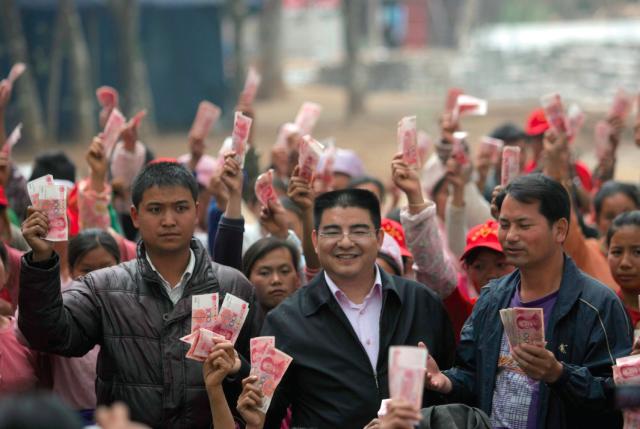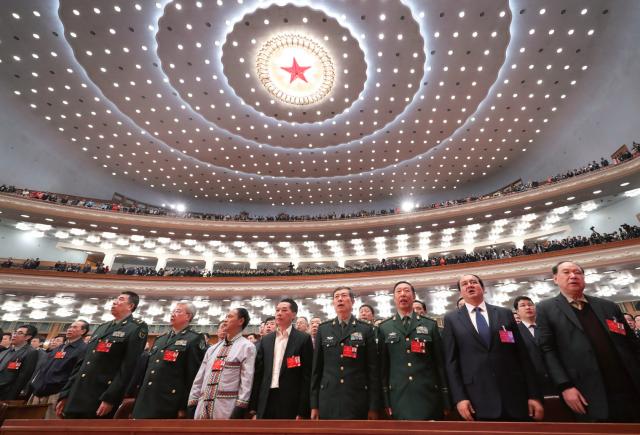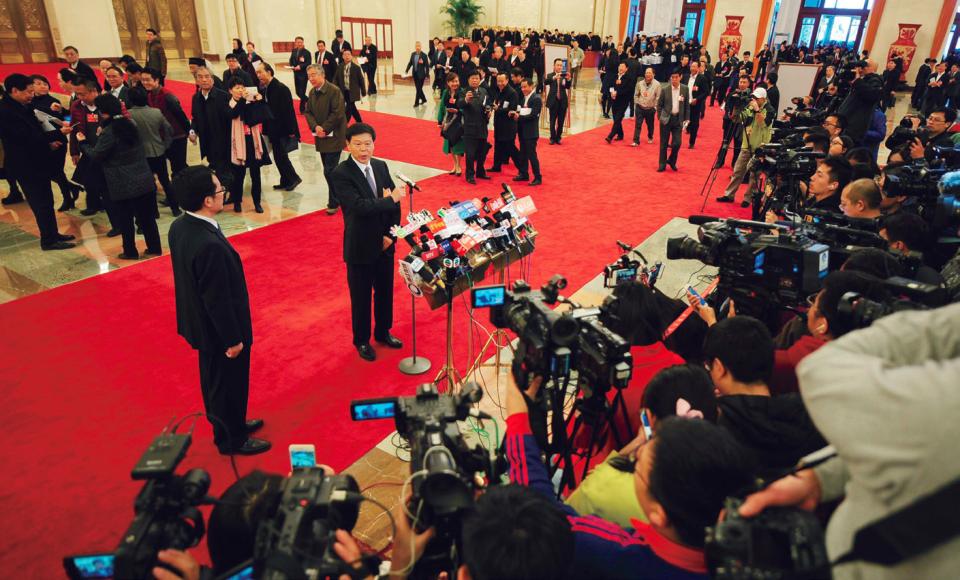With economics at the forefront of this year’s agenda, China maintains its cautious but firm positions on political issues
As China’s economic slowdown has become a global concern, the country’s economic policies have dominated the government docket and monopolized media coverage of this year’s Two Sessions, the annual political gatherings of the National People’s Congress (NPC) and the Chinese People’s Political Consultative Conference (CPPCC). But, beyond the economic arena, both meetings conveyed delicate yet important messages revealing Beijing’s perspective toward the various political challenges it faces in 2016.
Charity Law One of the most-watched political issues of this year’s Two Sessions was the new Charity Law, China’s first piece of legislation regulating this sector. The law eases restrictions on fundraising and operations for charity organizations, and was passed on March 13 by the NPC, a major function of which is to enact legislation, and will become effective September 1.
Despite an overall trend of rapid growth in charitable donations in the past decade, during which the amount given increased more than tenfold, from 10 billion yuan (US$1.54bn) in 2004 to 104 billion yuan (US$16bn) in 2014, China remains far behind most of the rest of the world in terms of giving. Out of the 145 countries and regions listed on the Charities Aid Foundation World Giving Index for 2015, China came in second to last. A major setback is a general lack of confidence in charities’ authenticity, especially following scandals in recent years that have tarnished the reputation of domestic philanthropic organizations as a whole.
The new law appears aimed at fixing various institutional problems underlying China’s ailing charity sector. It liberalizes restrictions on registration, fundraising and donations; offers tax cuts for donations; and improves regulations on transparency.
Currently, charity groups can only register legally through a State-run “master” organization.
Under the new law, they will be able to register directly with the Ministry of Civil

Chen Guangbiao (center), a Chinese tycoon, gives donations to earthquake victims in Yingjiang, Yunnan Province, March 16, 2011
Affairs, although foreign-run groups are required to register “in cooperation with Chinese charities.” The new law relaxes the restriction on fundraising by allowing any registered group that has been operating for two years to seek donations from the general public. The law also offers tax credits for donations made by corporations, though it only applies if the donated amount is lower than 12 percent of the corporation’s profits.
To tackle the public’s low level of trust in charities – especially the country’s largest, government-run foundation, the Red Cross Society of China, which has been implicated in a number of flashy, high-profile scandals in recent years – the law requires donationdependent charities to publish annual reports that specify staff pay and benefits. In addition, these financial reports must be audited.
While the new law has been widely welcomed, activists remain concerned and view it with a critical eye. Many are worried about the implementation of the law at the local level, as local government agencies tend to distrust private charitable organizations and lack experience working with them.
Moreover, the law’s narrow scope covers only “charitable groups,” and not organizations that would have been included in a broader term, such as “non-profit organizations.” Many are concerned that public interest groups, such as human rights organizations and environmental groups, will continue to be tightly restricted. Activists are particularly concerned that the law’s ban on activities that “threaten national security,” without detailing how this allegation would be defined, could lead to abuses in implementation.
By passing the Charity Law, authorities have taken a major step towards promoting a healthy charity sector, but it appears that the leadership is not yet ready to loosen its grip on other civil organizations.
Defense Budget China watchers follow the Two Sessions closely, as China’s leadership often drops hints about its views on a variety of issues during the annual meetings. This year was no exception. Among a wide range of figures that are released during the annual meetings, perhaps the most highly anticipated number, apart from China’s official GDP growth target, is the annual military budget. On March 5, China announced that national defense spending will increase by 7.6 percent to 954 billion yuan (US$147bn) in 2016, the lowest percentage increase since 2010. Between 2011 and 2015, China’s military expenditure saw a five-year run of double-digit increases, following a hike of 7.5 percent in 2010.
The relatively low figure this year surprised some, as various Hong Kong and overseas Chinese media groups had predicted that China’s defense budget would grow by 20 percent following the recent launch of ambitious military reforms, which aim to modernize the country’s military.
In an interview with the State-run Xinhua News Agency, Major General Chen Zhou of the People’s Liberation Army Academy of Military Science described that smaller increase in defense expenditure as “a prudent and moderate move,” in line with China’s “economic and social status quo.” Challenged with an economic slowdown, China’s economy expanded by 6.9 percent in 2015 and government revenue increased by 8.4 percent, marking the lowest such growth figures since 1990. Apart from economic concerns, some analysts argued that this modest increase in military expenditure is a signal that China seeks to lower tensions regarding territorial disputes in the South China Sea, where a confrontation with the US has become increasingly likely as Washington

Delegates representing various sectors sing China’s National Anthem in the Great Hall of the People in Beijing at the opening of the Two Sessions
has ramped up its freedom of navigation operations in the region.
In a separate report released on March 13, Zhou Qiang, president of China’s Supreme People’s Court, announced that China will create an “international maritime judicial center” to protect its national sovereignty and maritime rights.
China has refused to participate in an arbitration case brought by the Philippines at the Permanent Court of Arbitration in The Hague regarding China’s maritime claims in the South China Sea. The move to establish an international maritime judicial center comes as the world waits for the Hague ruling to be issued in May. So far, there are few specifics on how China’s judicial center will operate, but it could become a major focal point in the coming months.
Across the Straits Beijing’s Taiwan policy was also a major focus of this year’s Two Sessions. Earlier this year, pro-independence Democratic Progressive Party chairwoman Tsai Ing-wen defeated the ruling Kuomintang (KMT) Party candidate in the general election, and will assume the island’s top leadership position on May 20. Tsai has pledged to maintain the “status quo” of the cross-Straits relationship, but does not accept the 1992 Consensus, which represents a principle agreed upon by the KMT and Beijing in 1992 that there is “One China,” with both sides free to interpret this concept individually.
In recent months, Beijing has repetitively warned that the 1992 Consensus is the political foundation of the cross-Straits relationship, and the failure to endorse it will severely damage the Beijing-Taipei bond. As Tsai’s May inauguration day approaches, her vague stance has put the Chinese mainland increasingly on edge.
On March 5, in a meeting with Shanghai delegates during the NPC session, Xi Jinping further delineated Beijing’s position. Xi reiterated the significance of the 1992 Consensus and urged the Taiwanese side to “both recognize the historical reality of the 1992 Consensus and acknowledge its core significance.” Xi said: “We will resolutely contain... secessionist activities in any form, safeguard the country’s sovereignty and territorial integrity, and never allow the historical tragedy of a split nation to happen again.” Without mentioning Tsai specifically, Xi said Beijing’s policy “will not change with the changes in Taiwan’s political situation.” Xi’s statement appears to be a response to a speech Tsai made in January, in which she directly addressed the 1992 Consensus issue for the first time. She said she would accept the 1992 meetings as a “historical fact,” but fell short of accepting the 1992 Consensus in principle.
Almost immediately after the Two Sessions’ conclusion, China announced on March 17 that it had resumed diplomatic relations with Gambia, a country which had maintained official ties with the Republic of China, Taiwan’s official name, for two decades.
Gambia suspended its diplomatic relationship with Taiwan in 2013.
This latest gambit has been widely interpreted as a warning to Tsai. Under the administration of Ma Ying-jeou, Beijing and Taipei had agreed on a “diplomatic truce.” Many are now concerned that truce could turn sour after Tsai assumes office, making the cross-Straits relationship one of the biggest uncertainties Beijing will face in 2016.
By and large, occupied with the daunting task of maintaining China’s economic growth, the central leadership has adopted a low-profile, prudent but firm position toward the various contingencies it faces in the political and security realm.

 Old Version
Old Version

